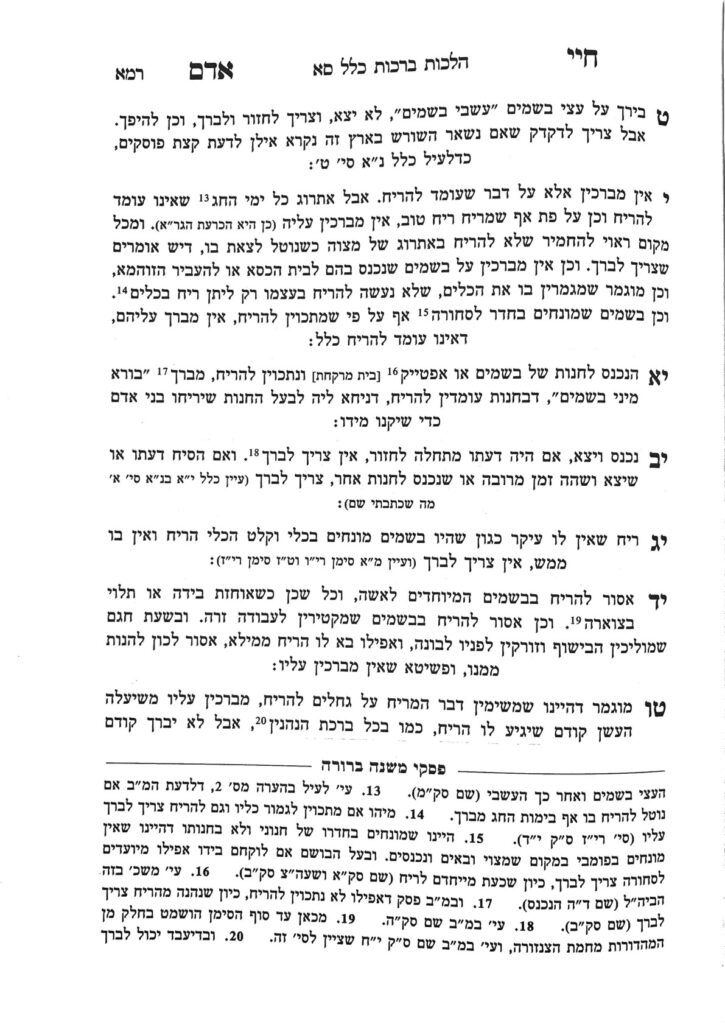We are continuing in siman 12. We learned that if one leaves a perfumery with the intent to return, the leaving is not considered a hefsek, and one does not make a new bracha upon their return. The Magen Avraham gave two explanations as to the difference between the halachos of shinui makom regarding food and smells. The Mishnah Berurah only accepted the Magen Avraham’s second answer, and we therefore pasken that any item which requires an action to smell it requires a new bracha when a shinui makom is effected. In a perfumery, where the smell wafts towards a person without any action, one does not require a new bracha should one effect a shinui makom.
The Chayei Adam wrote that another situation in which one would require a new bracha is if they leave the store and effect a hesech hadaas on the smell. That is, they have deliberate intent that they no longer wish to return to the store. If one left with the intent to return, and later changed their mind, they have also effected a hesech hadaas and would require a new bracha should they return.
The Chayei Adam wrote that a final situation in which one would require a new bracha is if they remain away for a long time, even if they do not effect a hesech hadaas. In our siman, the Chayei Adam does not delineate a specific amount of time. However, there is a similar discussion regarding tallis. If one takes off their tallis for a purpose (e.g., to go to the bathroom) with the intent to put it back on, they do not need to make a new bracha, provided they did not effect a hesech hadaas. If one leaves their tallis off for a long time, but still did not effect a hesech hadaas, the Mishnah Berurah uses the language of “miyad”, immediately, in describing the amount of time that may elapse before one would be required to make a new bracha. The Mishnah Berurah cannot mean “immediately” in the literal sense, because it would be impossible to take off a tallis and accomplish any sort of purpose in such a short amount of time. Rav Moshe Shternbuch suggests that “miyad” refers to within 30 minutes, as a 30 minute window is found in other areas of halacha as referring to a short amount of time.
However, the Shulchan Aruch Harav seems to allow one to keep their tallis off for even two to three hours as long as there has been no hesech hadaas. Due to the safeik, we apply the general rule of safeik brachos le’hakeil, and, provided one has not effected a hesech hadaas, one would not make a new bracha on their tallis even if they took it off for two or three hours. Similarly, regarding our halachos, one would not make a new bracha upon returning to the perfumery, even if they were away for two to three hours.
Summary
- If one makes a bracha on smell, the bracha will extend for as long as they remain in that makom.
- There are three situations in which one would require a new bracha:
- If one effects a hesech hadaas on the smell. A hesech hadaas is defined as an active decision to no longer smell the item or return to the store.
- If one left the store with the intent to return, and later changed their mind, they have also effected a hesech hadaas and would require a new bracha should they return.
- If one did not have any particular intent but remained away for a long time. A long time is defined as more than three hours.
- If one went into a different store.
- If one effects a hesech hadaas on the smell. A hesech hadaas is defined as an active decision to no longer smell the item or return to the store.



